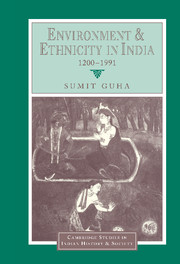Book contents
- Frontmatter
- Contents
- List of maps
- List of tables
- Acknowledgements
- Glossary
- List of abbreviations
- Introduction
- 1 From the archaeology of mind to the archaeology of matter
- 2 Subsistence and predation at the margins of cultivation
- 3 State formation in the highland forests 1350–1800
- 4 The peoples of the Sahyadri under Marathas and British
- 5 The central Indian forest from Mughal suzerainty to British control
- 6 The central Indian forest under early British rule
- 7 Identities and aspiration – not noble savage but savage noble
- 8 The high colonial period and after – new patterns of authority and power
- 9 From sanctuaries to safeguards: policies and politics in twentieth-century India
- Conclusion
- Afterword
- Bibliography
- Index
2 - Subsistence and predation at the margins of cultivation
Published online by Cambridge University Press: 12 November 2009
- Frontmatter
- Contents
- List of maps
- List of tables
- Acknowledgements
- Glossary
- List of abbreviations
- Introduction
- 1 From the archaeology of mind to the archaeology of matter
- 2 Subsistence and predation at the margins of cultivation
- 3 State formation in the highland forests 1350–1800
- 4 The peoples of the Sahyadri under Marathas and British
- 5 The central Indian forest from Mughal suzerainty to British control
- 6 The central Indian forest under early British rule
- 7 Identities and aspiration – not noble savage but savage noble
- 8 The high colonial period and after – new patterns of authority and power
- 9 From sanctuaries to safeguards: policies and politics in twentieth-century India
- Conclusion
- Afterword
- Bibliography
- Index
Summary
Introduction
The opening chapter of this work was, I must admit, a swift slash-and-burn exercise, intended to clear the ground for my own hypotheses, and it is now incumbent on me to cover the devastated terrain. This chapter begins that process, commencing with a quick survey of the landscapes and biota of the Dakhan in the current millennium. It then considers the opportunities that this ecological mosaic gave humans, and how they sought to exploit it (and each other) in that period, and how they clashed and coalesced in that effort. The first section demonstrates the extent to which humans modified the environment to suit their livestock, and so the second one considers the significance of pastoralism in the political economy of the peninsula. The subsequent section then discusses how periods of agrarian crisis might result in the political dominance of such pastoral communities pending the cyclical re-establishment of agriculture. The ecological warfare that accompanied the reestablishment of the agrarian order is the next theme examined, followed by a consideration of inter-community relations in the woodland itself. The chapter concludes with a case-study illustrative of the mutability and mobility that characterised the human communities of the sub-continent through the study of an ethnic group that moved from being forest warriors to being professional musketeers and police. Their transition to gentry status failed, and one of their ethnonyms vanished, and another became a Scheduled Caste in Maharashtra.
- Type
- Chapter
- Information
- Environment and Ethnicity in India, 1200–1991 , pp. 30 - 61Publisher: Cambridge University PressPrint publication year: 1999



